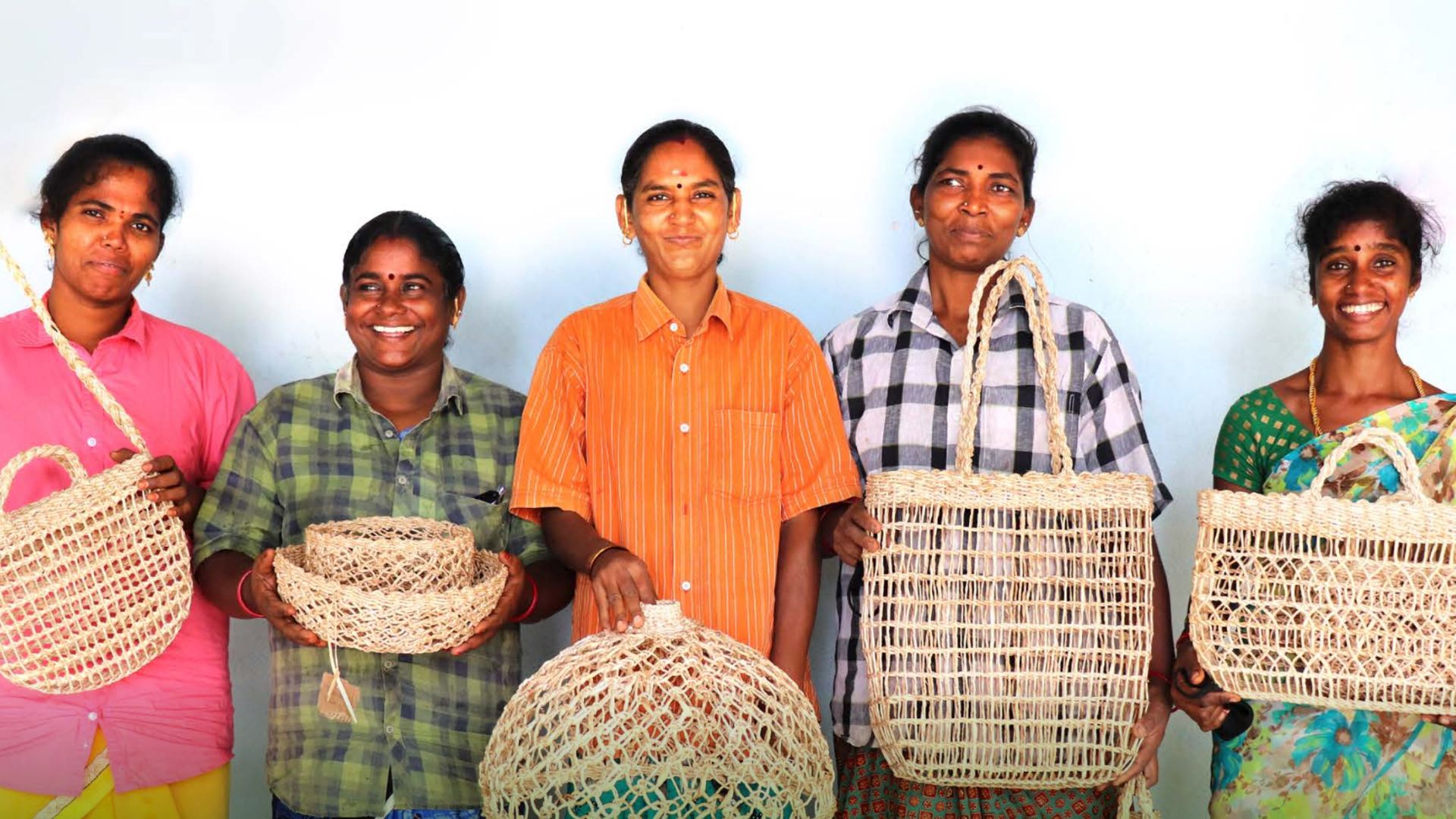Through the POWER initiative, women are taking charge of their futures in a climate-positive way.
July 2022

Women artisans who received training through the POWER project are helping reduce carbon footprints by recycling local natural fibers like banana, bamboo and non-timber forest produce into ecofriendly products. (Courtesy USAID/India)
Poornapechi is a basket weaver from Tamil Nadu, and a mother of two children. During the Covid-19 pandemic, she got a chance to hone her craft and become a skilled artisan through training received from the Producer-Owned Women Enterprises (POWER) project. Poornapechi is now driven by the idea of improving the next generation’s standard of living. “I am motivated to make two pieces a day because the more I make, the more I can earn—which means I can help my family out of debt and invest in my children’s future,” she says.
Initiated in 2019 by the United States Agency for International Development (USAID) and Bengaluru-based Industree Foundation, the POWER project was designed to create economic opportunities for marginalized and underserved women in rural India. Three years later, the project’s impact has gone beyond financial self-reliance. Participants are now upskilling not just to build secure futures for themselves, but also to help reduce carbon footprints by recycling the abundantly available local natural fibers into ecofriendly products.
The project trains women artisans in tribal and rural areas to make products from natural fibers like banana, bamboo and non-timber forest produce. The training helps them develop their own creative manufacturing enterprise.
It also enables them to understand their role in the conservation of the environment and ethical ways of sourcing and manufacturing, along with helping them connect with national and global markets.
Empowering women
“A key aspect of the training is gender empowerment. This has initiated far-reaching changes in rural communities with the potential to transform future generations,” says Varghese Paul, forestry specialist and deputy director, General Development Office, USAID/India. “By training women producers to build both hard and soft skills in running their creative manufacturing enterprises, the initiative is giving them the power to decide the course of their futures.”
Mikhala, who trains tribal women artisans working with non-timber forest produce in Odisha, says the biggest takeaway from the POWER initiative is what she learned about gender equality. “I understand now that employment and economic independence is an equal right,” she says. “Daughters too can aspire to work and earn, and should get the same rights as sons.”
Dhanalakshmi, a trainer from Tamil Nadu, learned about gender roles, opportunities and the regional working environment through the POWER project. She is now working toward a specific goal—to have her daughters become financially independent.
“My daughters should pursue their studies well and become financially independent so that they can look after themselves and lead a good life,” Dhanalakshmi says.
Holistic approach
POWER uses a holistic approach to ensure that its enterprises can grow to be self-sustainable. It offers incubation of enterprises, access to technical and soft skills, helps create product designs, enables innovation, and provides access to markets, working capital and equity.
For instance, products from GreenKraft, an enterprise supported by POWER in Tamil Nadu that manufactures baskets from recycled banana bark, are purchased by international clients like IKEA and Caravane. So far, products worth over $2 million have been sold to international retailers.
In addition, the owner-members of GreenKraft enjoy regular and formal work with full labor standards. They have social security and pension benefits, health insurance, childcare and opportunities for skill development and career advancement.
Many members of GreenKraft are earning money for the first time in their lives. To support them, the POWER project provides life skills training in key areas like digital banking, nutrition and health.
So far, the POWER initiative has set up 28 women-owned collective enterprises across Karnataka, Tamil Nadu and Odisha. It has helped over 6,800 women in rural and tribal areas become successful producers and entrepreneurs.
Jason Chiang is a freelance writer based in Silver Lake, Los Angeles.
Wonderful touch of POWER and EMPOWERING of rural tribal ladies to eke out their living in sustainable project.
Ashis kumar Basu
Wonderful touch of POWER and EMPOWERING of rural tribal ladies to eke out their living in sustainable project.